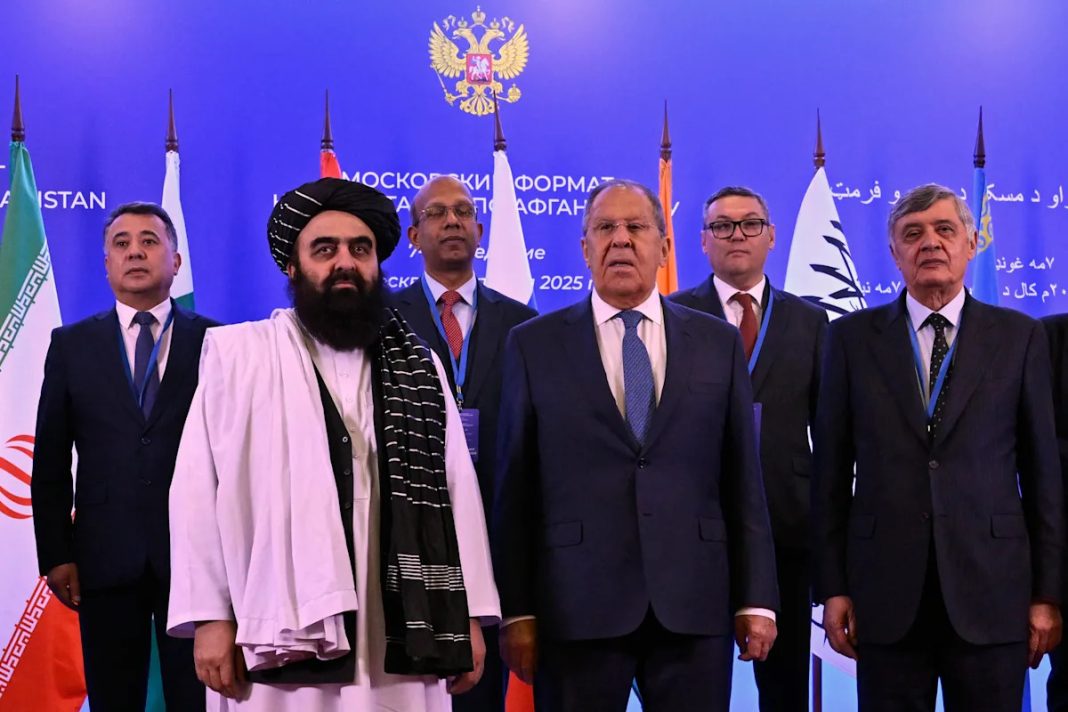Afghanistan’s regional neighbours, including India, have voiced a rare unified front by opposing foreign attempts to deploy “military infrastructure” in the country, as United States President Donald Trump presses to regain control of the Bagram airbase.
In a joint statement on Tuesday, members of the Moscow Format of Consultations on Afghanistan – which include US allies India and Pakistan – “reaffirmed their unwavering support for the establishment of Afghanistan as an independent, united and peaceful state”. The forum also includes Russia, China, Iran and Central Asian nations, all of whom strongly oppose any US return presence in Afghanistan.
The members “called unacceptable the attempts by countries to deploy their military infrastructure in Afghanistan and neighbouring states, since this does not serve the interests of regional peace and stability”.
Though the statement echoes last year’s forum language, it suggests broad regional opposition to Trump’s push to return to Bagram, which he handed over to Afghanistan’s Taliban five years ago as part of a deal paving the way for the US withdrawal from Kabul.
In backing the statement, India – a longtime US ally – navigates fraying ties with Washington and apparent rapprochement with the Taliban, which it long opposed but has in recent years cultivated ties with.
In the latest diplomatic outreach, India is set to welcome the Taliban’s Foreign Minister Amir Khan Muttaqi for a historic first visit to New Delhi this week, lasting from October 9-16.
After attending the Moscow forum, Muttaqi emphasised that Afghanistan will not accept any foreign military presence. “Afghanistan is a free and independent country, and throughout history, it has never accepted the military presence of foreigners,” he said. “Our decision and policy will remain the same to keep Afghanistan free and independent.”
Last month, Trump threatened “bad things” would happen to Afghanistan if it did not give back Bagram, and cited what he called its strategic location near China. The Taliban has rejected Trump’s calls to return the base.
Bagram is about 800km (about 500 miles) from the Chinese border, and about 2,400km (about 1,500 miles) from the nearest Chinese missile factory in Xinjiang.
Trump has referred to China as a key reason for wanting to retake control of Bagram, saying last month in London that the base is “an hour away from where [China] makes its nuclear weapons”.
Current and former US officials have cast doubt on Trump’s goal, saying that reoccupying Bagram might end up looking like a reinvasion, requiring more than 10,000 troops as well as the deployment of advanced air defences.
“The sheer logistics of negotiating redeployment and handing back would be extremely challenging and lengthy, and it’s not clear that this would serve either side’s strategic interests,” said Ashley Jackson, co-director at the Geneva-headquartered Centre on Armed Groups.
Bagram, a sprawling complex, was the main base for US forces in Afghanistan during the two decades of war that followed the September 11, 2001, attacks in New York and Washington by al-Qaeda.
Thousands of people were imprisoned at the site for years without charge or trial by US forces during its so-called “war on terror”, and many of them were abused or tortured.
The Taliban retook the facility in 2021 following the US withdrawal, which Trump first set in motion in his first term as president, and the collapse of the Afghan government with Joe Biden in the White House.

